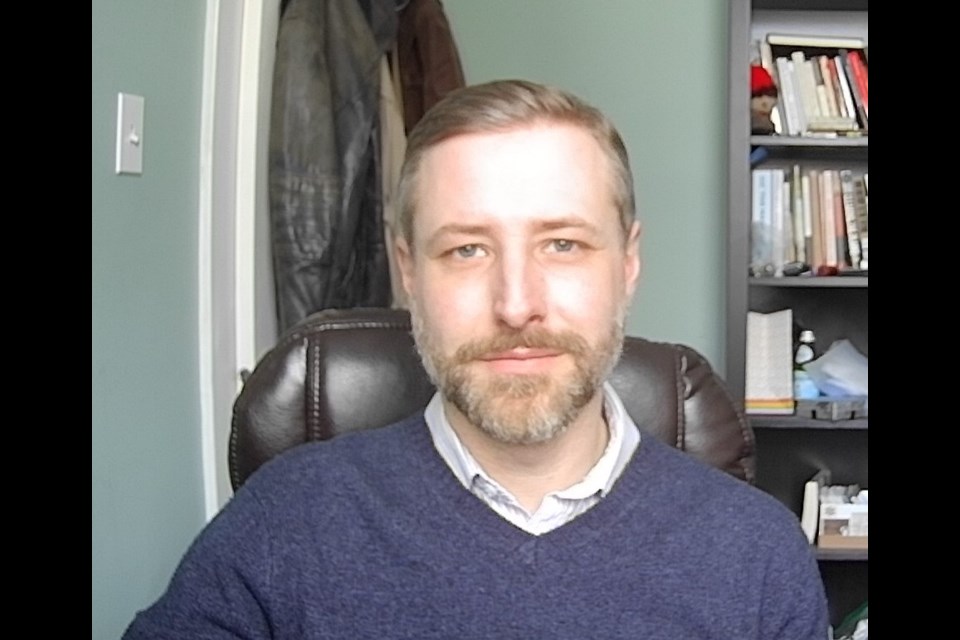WINNIPEG – For those living in Dryden, Ignace and Thunder Bay, Dr. Warren Bernauer will be touring Northwestern Ontario to speak about a book he co-authored with Joan Scottie and Jack Hicks, called I Will Live for Both of Us: A History of Colonialism, Uranium Mining, and Inuit Resistance.
Bernauer, who currently working as a postdoctoral fellow at the University of Manitoba in the Department of Environment and Geography and the Natural Resources Institute, still calls Northwestern Ontario his home.
Born in Red Lake and having graduated from high school in Dryden, Bernauer hopes to reconnect with the residents and provide his academic perspectives on key concerns on the political and economic issues of resource extraction in Northern Canada.
Bernauer said the book looks at key environmental issues that the Baker Lake Inuit community has raised in resistance to uranium mining.
For example, Baker Lake is one of very few inland Inuit communities. Whereas most Inuit communities have settled along the coastal regions and rely on hunting marine mammals as a way of life, the inland communities hunt and trap caribou as a main resource.
“When it comes to any mining project there is a struggle to keep those environmental protections in place,” said Bernauer.
“So, what happened in Baker Lake was there was this initial gold mine built around 2010. After about eight years, it ran out of ore. The issue with the agglomeration economy we ended up with a satellite project where to company built a second mine about 130 kilometres away from the original one, but they are using the mill at the original one and they have to truck ore 130 kilometres across the tundra through caribou migration routes.”
Bernauer said when the satellite location was proposed the company made promises to protect the caribou migration routes by closing down the road and building barriers, but “once the satellite location was up and running, they turned around and all this rhetoric about doing zero harm went out the window and it got replaced with rhetoric about needing to balance environmental concern with project economics.”
He also expressed that the book discusses the moral and political concerns of uranium mining and the nuclear industry.
“There are concerns about uranium from Baker Lake being uses to support nuclear weapons development. There’s concern about what’s going to happen with the spent nuclear fuel afterward, which is something that northern Ontario is quite familiar with as you are facing a proposal for a deep geological repository. There are some Inuit that don’t want the resources from their land to be used in a way that’s going to create this problem for other Indigenous groups elsewhere in Canada that are going to be left with the waste,” said Bernauer.
Bernauer said the book is written from the perspective of Scottie, who is an Inuit elder who manages the Hunters and Trappers Organization in Baker Lake Nunavut.
“It combines Joan’s memories, reflections, and writings with research that I did as a graduate student, and research that our co-author Jack Hick did as well as a scholar and an activist,” said Bernauer.
Bernauer wrote his dissertation on the politics of energy extraction in Nunavut. His research consists of his experiences as a volunteer with the Hunters and Trappers Organization in Baker Lake to help them participate in environmental issues related to uranium mining.
“Through that volunteer work, I learned about the local and regional politics around this proposed mine. I got this information from there. Along the way, I met this fabulous, very inspiring elder named Joan Scottie, who has been a leading spokesperson for her community’s resistance to uranium mining since the 1970s,” said Bernauer.
Scottie and Bernauer’s activist work consisted of writing submissions to regulators and presenting at hearings to raise awareness of the history of Baker Lake, its people, and the political and environmental impact of mining.
The first chapter of the book cover Scottie’s lived experience in her community.
“I think it’s notable that she doesn’t present a romanticized view of the past through rose-covered glasses. She is quite explicit that there were aspects of life on the land that she fundamentally doesn’t agree with, especially the way some women were treated. Nonetheless, she’s still a big supporter of maintaining Inuit culture and really taking the best from the past and applying it to the present,” said Bernauer.
The chapters that follow Scottie’s lived experience dig deep into the colonial process of Nunavut. Scottie reflects on her family location in Baker Lake where she and her sibling were placed in the residential school system. These chapters reflect the power dynamics and the resistance of the Inuit people.
From there, the book leads into the resistance to uranium mining in Baker Lake.
“Baker Lake is a unique community. It stopped the proposed uranium mine twice now. One from the 1980s and one in 2015. So, we document both of those struggles. We have a chapter about gold mining in the region because there is a gold mine adjected to Baker Lake as well,” said Bernauer.
Bernauer held a public event in Dryden on Tuesday, and will also hold events this week in Thunder Bay and Ignace.
- Ignace, Wed. May 17, 7 p.m. (Silver Tops Seniors Centre)
- Thunder Bay, Thurs., May 18, 6 p.m. (Thunder Bay Art Gallery)
The book can be ordered directly from his publisher's website. It is also available on Amazon.
Bernauer will also have some copies to sell and sign at a discounted rate.
